La Plata's Ellingwood Ridge,
"It's like eating an Elephant…"
By Warren Teissier
(warra@comcast.net)
Photos by George Bell
(gibell@comcast.net)
Written July 2002; Climb date 7/6/2002
[Click on any image for the full size version]

|
About three quarters of the two mile long Ellingwood ridge, taken from the standard route.
This image was created by splicing 4 standard images together.
Copyright © 2002 by
George I. Bell
|
Flipping through the summit register of La Plata Peak, I find the entries
of John "Homie" Prater and Lori. They had climbed the Ellingwood
arête the day before. Their entries pretty much sum up the feelings
George and I have about the route:
John's entry in the comment section: Ellingwood Ridge, AWESOME!
Lori's entry in the comment section: Ellingwood Ridge, LONG!
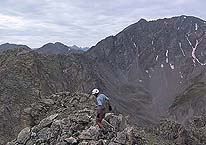
|
View of the summit from the start of the difficulties
Copyright © 2002 by
George I. Bell
|
"I want to do some long traverse" George stated a couple of weeks
before, while we discussed how to best spend our 4th of July weekend.
George and I set out to climb La Plata via its most difficult route: the
Ellingwood ridge. This rugged ridge runs roughly North to South,
curving to the West until it joins the summit in one last dramatic 1300ft
push to a rocky false summit. From there, another third of a mile
deposits you at the summit. The majority of this 2 mile traverse occurs
at 13,000 feet and can be done anywhere from sustained 3rd class to 5.4
with some rappels.
Word has it that in the summer of 1921 Albert Ellingwood was
heading up the approach of the standard route on La Plata with a group
of people. At some point, he separated from the group, telling them he
would climb the peak via the ridge that now bears his name. They
waited for him at the summit and when he did not show up they went
down worried about his fate. Fourteen hours after they had separated a
thoroughly satisfied albeit tired Ellingwood showed up at their campsite
after completing the arête route.
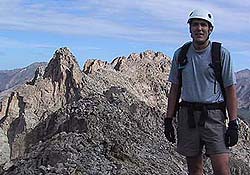
|
Looking back from about 1/3 of the way up
Copyright © 2002 by
George I. Bell
|
I chanced into Homie and Laurie at the trailhead of La Plata (what are
the odds?), they were descending after completing the ridge while I had
gone there to scout the approach for our climb on the next day. Homie
had hauled a pack full of rope and gear and never used it… after some
discussion it became clear to me that we should go light even of this
meant not staying on the ridge 100% of the time. That night George and
I agreed on going fast and light and settled for a 5:00 am start.
We started up the trail at 5:30 am after some logistics miscalculation.
The trail contours East for two or three miles and crosses 4 creeks. We
followed the last one up the mountain. We emerged from tree line at
11,200ft, exactly 1000ft above the trailhead. We were faced with
1,500ft of lose dirt and talus, large, unstable, talus. This was by far, the
worst part of the climb.
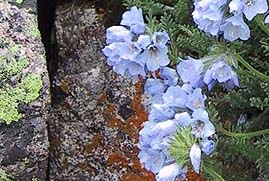
|
Sky Pilots on the Ellingwood Ridge
Copyright © 2002 by
George I. Bell
|
We worked our way towards some rock bands and wound up 3rd
classing our way up them in order to avoid the talus nightmare. At one
point, George dislodged a football size rock as I worked my way below
him. I heard the rock come lose followed by his desperate call for me to
move out of the way… Luckily, I picked the correct side to move to
and the rock bounced past me and to the bottom of the slope… From
then on we started switch backing up the slope, I zigged when George
zagged to minimize the amount of time I was directly under him.
Two hours after we started, we were above the talus field and on a
broad grassy shoulder where 5 mountain goats and a Ptarmigan went
about their business. The mountain flower patches where nothing short
of amazing and George let loose the artist in him.
For the first time we were able to see the complete ridge, all two miles
worth of it. The sight is daunting especially when you consider the
1300 ft climb at its end. "It's like eating an Elephant" George said, "if
you think about it as a whole it seems impossible, you need to take it a
bite at a time…"
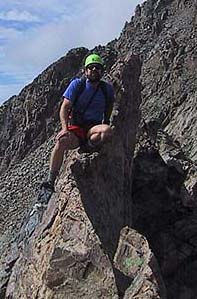
|
A true knife-edge section
(also easily avoidable)
Copyright © 2002 by
Warren Teissier
|
Our objective was to stay on the ridge as long as we could. We
achieved this for the most part with the following few exceptions:
- All along the ridge, there are sections where it is peppered by
small gendarmes (5-10ft tall), most made of crumbly rock,
looking more like giant cairns. Climbing these seemed dumb
and inefficient.
- An interesting feature of the ridge is that the North face of the
pinnacles is less steep than the South side. This may force one
to rappel down if an easy down climb is not found. Because of
this, we bypassed, two large towers in the first half of the ridge
(one of which, contained so much lose rock that we probably
would not have climbed it even with a rope).
- Finally, we bypassed a tower that sported a couple of nice
cracks up a slab. We discussed soloing this beautiful 5.easy
obstacle, but two overhanging blocks above it put an easy top
out in question. Additionally, we were not sure the pinnacle
could be down climbed. Remembering Roach's mantra we
determined that "This is not a good rock to be on top of
without a rope" and we bypassed it on the left. This was the
only spot where we thought a rope was truly needed. Mind you,
it's a long way to bring a rope and harnesses for a single 70ft
pitch…
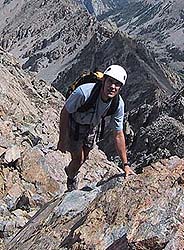
|
Just below the 14,000' false summit
Copyright © 2002 by
George I. Bell
|
All in all, I would say we stayed on the ridge some 85% of the time and
climbed a good amount of 4th class and some short easy bursts of 5.easy
particularly on the descents. A couple of times we found that the easier
down climbs were on the West side via exposed but cool ramps. Gerry
Roach mentions you will spend very little time on the ridge if you want
to keep it a 3rd class…. This is perhaps a little exaggerated, although I
can see one spending a huge amount of time route finding and
backtracking if you try to stay on the ridge and keep the difficulty at
that level.
We finally took a breather at the low point of the ridge where it curves
just before the last 1,300+ ft climb to the top. As we drank and put on
sunscreen we looked up at a broad talus slope leading to the top.
Memories of the first talus field of the day were still fresh on our minds
and we hoped for an easy escape from the rollin' talus hell. We stuck to
the ridge, having to chimney up an awkward slot and discovered to our
relief, that the ridge itself was a great bypass of the talus field. This was
one of the best sections of the climb.
All along, we had seen people on the summit and expected a large
crowd at the top. Some of us, even expected them to cheer us on and
offer us pina coladas at the top, but this may have been hypoxya
induced wishful thinking…
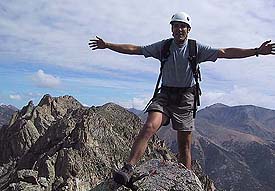
|
Warren celebrates near success
Copyright © 2002 by
George I. Bell
|
Six hours after leaving the trailhead we reached the deserted summit
and proceeded to sign our names in the register. A few minutes later,
we were joined by a couple of waves of people reaching the summit via
the regular route. Clouds were gathering and we decided to get started
with the knee jarring descent via the regular route. The trail has been
greatly improved according to George and we only had to do the talus
dance for some 200 yards…
We reached our car 8 hours after we started. During the descent we had
wonderful views of the arête. We had come a long way: 10 miles of
hiking, 5,200 vertical ft cumulative, 4 hours of 3rd and 4th class
scrambling between 12,500 and 14,300ft. Hard to believe we had
climbed that whole thing…
We had in fact eaten the Elephant. What a great day!
 Trip Report Index ...
Trip Report Index ...






